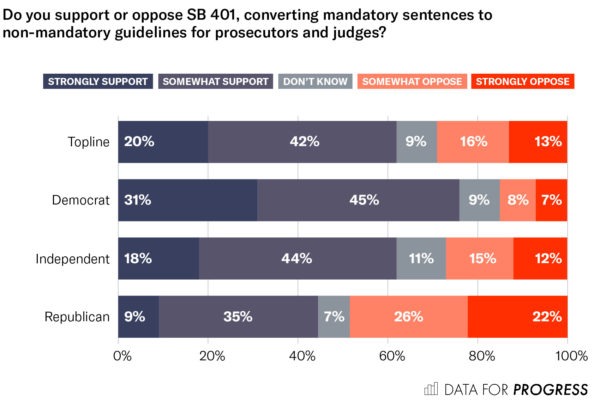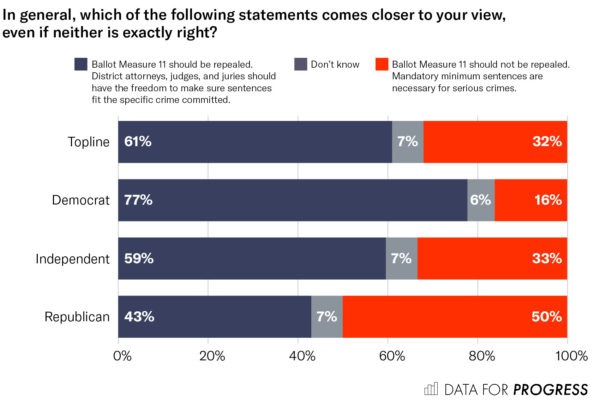Poll: Oregon Voters Support Repealing Mandatory Minimum Laws
A new poll shows that a majority of Oregon voters want to reverse mandatory minimum sentencing laws and restore judicial discretion to sentencing decisions.

A new poll from Data for Progress and The Lab, a policy vertical of The Appeal, shows that a majority of Oregon voters want to reverse mandatory minimum sentencing laws in the state, and restore judicial discretion to sentencing decisions.
The poll gauged support for Measure 11, a controversial 1994 law that mandated minimum sentences for specified felonies, and Senate Bill 401, which would effectively repeal Measure 11 by converting most of its sentencing requirements to non-mandatory “presumptive” guidelines. The results show that:
- 62% of Oregon voters—including 76% of Democrats and 62% of independents—support passage of SB 401, which would effectively repeal Measure 11 and convert mandatory sentences into non-mandatory guidelines.
- 61% of Oregon voters agreed that “Ballot Measure 11 should be repealed,” compared to 32% who instead agreed that “mandatory minimums are necessary for serious crimes.”
Polling & Findings
Oregon’s Ballot Measure 11 was passed in 1994, and it instituted mandatory minimum sentences for certain crimes such as robbery and kidnapping. The Oregon Senate is considering a new bill, SB 401, that would effectively repeal Ballot Measure 11 by converting mandatory minimum sentences to non-mandatory guidelines for certain felonies other than murder. This would give prosecutors and judges more discretion to sentence people according to the circumstances of the crime committed.


Key Context
In 1994, Oregon voters passed Ballot Measure 11, known as “One Strike You’re Out,” ushering in an era of mandatory minimum sentences of up to 30 years for specified crimes. The measure precludes any possibility of leniency or early release, including parole. Over 2,000 Measure 11 indictments are issued every year in Oregon, and according to some estimates, as many as half of those incarcerated in Oregon prisons are serving a Measure 11 sentence.
The measure has survived several repeal efforts, despite growing criticism that it feeds mass incarceration, confers unfair advantages to prosecutors, and forces judges to ignore critical mitigating evidence—such as the effects of abuse and other trauma—especially in cases against women and youth under 18.
Critics also point to the disparate impact of Measure 11 indictments on Black Oregonians. According to a recent Oregon Criminal Justice Commission (OCJC) report that analyzed data between 2013 and 2018, “across the most commonly indicted Measure 11 crimes (Assault I and II, Sex Abuse I, Robbery I and II, and Rape I), Black men are sentenced to prison more often than white men. In some instances, such as for Assault I, the gap is nearly ten percentage points.”
The latest reform measure, Senate Bill 401, introduced by State Senator Floyd Prozanski, proposes converting mandatory minimums to “presumptive” sentences for offenses other than murder, which means they would serve as guidelines rather than binding requirements for judges. If passed, the bill would restore discretion to judges to consider each individual’s unique circumstances and history in sentencing. The Senate bill and its House companion, HB 2002, are currently under committee review.
Despite a growing body of evidence that mandatory minimums do not enhance safety or fairness, the Oregon District Attorneys Association voted in January to officially support Measure 11, with three of its 36 members voting in opposition.
Polling Methodology
From March 5 to March 9, 2021, Data for Progress conducted a survey of 565 likely voters in Oregon using web panel respondents. The sample was weighted to be representative of likely voters by age, gender, education, race, and voting history. The survey was conducted in English. The margin of error is ±4 percentage points.
CORRECTION: a previous version of this article stated “36 members of the Oregon District Attorneys Association voted in January to officially support Measure 11.” The piece was updated to reflect that District Attorneys Mike Schmidt of Multnomah County, John Hummel of Deschutes County and Matthew Ellis of Wasco County all voted to oppose Ballot Measure 11.

